Friday, July 22
Happy days are here again…

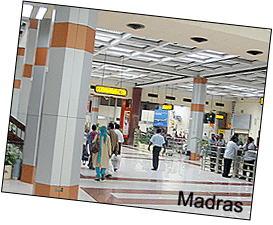 I
am enamored of Chennai! It seems so much cleaner, greener and all together
more civilized than Delhi. Even the airport was a gleaming vision of
white marble and bright lighting compared to the drabness of Delhi's
domestic airport. And miracle of miracles, I saw a blue sky! I had noticed
the lack of it but I didn't realize how much I missed it till I saw
it again! But A. says that old-timers think the city has sped up unbelievably
and is becoming a traffic-ridden pit of chaos. Little do they know.
I
am enamored of Chennai! It seems so much cleaner, greener and all together
more civilized than Delhi. Even the airport was a gleaming vision of
white marble and bright lighting compared to the drabness of Delhi's
domestic airport. And miracle of miracles, I saw a blue sky! I had noticed
the lack of it but I didn't realize how much I missed it till I saw
it again! But A. says that old-timers think the city has sped up unbelievably
and is becoming a traffic-ridden pit of chaos. Little do they know.

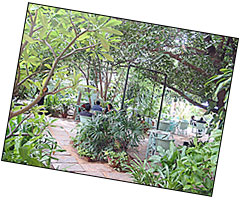 Yesterday
morning, after playing with A.'s baby who is picking up Tamil and seems
to be the pride and joy of the entire neighborhood, we went for a drive
and passed many sparkling sights (see, in the South they believe in
sprucing up their monuments!). Among them were a beautiful gleaming
white cathedral, the Santhome (St. Thomas) Cathedral. The other beautiful
buildings were the police headquarters, a former abode of the Jaipur
princes and, inevitably, a Gymkhana-type club -- the Madras Club (relative
of Ranikhet Club, Delhi Gymkhana, et al.). The police headquarters are
on the Marina, opposite the beach, and are also housed in an old colonial
building, and also dazzling white. The princely abode is home to a fancy
boutique with a splendiferously green and quiet garden. The green here
is lovely -- lots of frondy coconut palms and other tropical types of
foliage as well as the flame trees you get in the north.
Yesterday
morning, after playing with A.'s baby who is picking up Tamil and seems
to be the pride and joy of the entire neighborhood, we went for a drive
and passed many sparkling sights (see, in the South they believe in
sprucing up their monuments!). Among them were a beautiful gleaming
white cathedral, the Santhome (St. Thomas) Cathedral. The other beautiful
buildings were the police headquarters, a former abode of the Jaipur
princes and, inevitably, a Gymkhana-type club -- the Madras Club (relative
of Ranikhet Club, Delhi Gymkhana, et al.). The police headquarters are
on the Marina, opposite the beach, and are also housed in an old colonial
building, and also dazzling white. The princely abode is home to a fancy
boutique with a splendiferously green and quiet garden. The green here
is lovely -- lots of frondy coconut palms and other tropical types of
foliage as well as the flame trees you get in the north.
In another sign of Chennai's modernity, the hotel I visited to book a room for the last three days of my stay here told me that they had no computers with internet connections ... because the whole hotel is wireless. Wireless! And to think I left my computer in Delhi and so cannot download nor post any photographs for two weeks.
(I added some photographs on Tuesday, July 27, with the help of a cyber cafe that burned my photographs onto a CD and the discovery that my hotel owner in Pondicherry has Adobe Photoshop on his computer. He is an artist.)
But here is a description of some of the photographs I have taken:
Chennai's blue skies
A new (for me) fruit called mangustan that is purple on the outside, white on the inside and tastes citrusy.
The ladies' bathroom at the Madras Club
Coconut palms
A cellphone billboard only an Indian could make sense of for reasons that I will explain later
The Bay of Bengal
The baby in the Bay of Bengal
A little girl selling balloons on the beach
The Madras Club
 The Madras Club is another heavenly hangout with a gorgeous pool and lovely old furniture, and naturally, many gatekeepers and member signatures requested at every possible point of entry. We swam there yesterday.
The Madras Club is another heavenly hangout with a gorgeous pool and lovely old furniture, and naturally, many gatekeepers and member signatures requested at every possible point of entry. We swam there yesterday.
Here is a quote from a history of the club by a Mr. S. Muthiah about how much more inclusive it has become since its inception:
"As this writer has stated in another context, 'No Indians, no traders, no women and no dogs' was the attitude of most of the European clubs in the major cities till well into Independence. Much of this has happily changed bit by bit from the Fifties, and clubs in India, while still maintaining an exclusivity, are much more family institutions and an integral part of the lives of certain strata of society."
Serendipity
We went back there again today to go to the library and A. had to go to the reception for the guestrooms to book a room for a friend of hers. I was idly glancing around, and my gaze happened to fall upon the register of future guests where a name I recognized leaped to my eye. An Indian lady, U., who makes a wine called Chateau Gamage in France and with whom I ate dinner a month ago in Bordeaux, was due to arrive within the hour. And strangely enough, I had just been talking about her yesterday, because my inflight magazine cover story was all about Indian wine and wine tourism. Her wine is good but she hasn't been able to sell it in India yet.
A little while later, we bumped into her as she was getting out of her car. Needless to say, she was quite surprised. I think she wasn't displeased to see me, even though she had come to India to escape from life. But as I myself have noticed, India is not really the best place for that.
She had just come back from Pondicherry and we had an interesting conversation about France and India and classism and racism. The library staff were very gracious and forebore from pointing out to us that it was not really a place for animated conversation. We’re going to meet for a drink tomorrow.
Since I'm going to Pondicherry myself, and she said hotels were quite full, I thought I better make a reservation myself. But the hotel I called said that they never took reservations. So I asked them how busy they were at the moment, and they said they were all booked up through the 24th! Does not compute.
The Beach
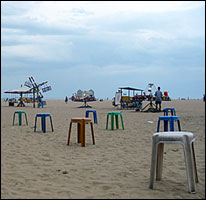 In the evening we took the baby to the beach where she ate large amounts of sand. Her grandmother bought her a balloon from a very sweet child who goes to school during the day (grade five) and sells balloons on the beach at night. The balloons cost Rs. 10 each (about 25 cents).
In the evening we took the baby to the beach where she ate large amounts of sand. Her grandmother bought her a balloon from a very sweet child who goes to school during the day (grade five) and sells balloons on the beach at night. The balloons cost Rs. 10 each (about 25 cents).
Saturday, July 23
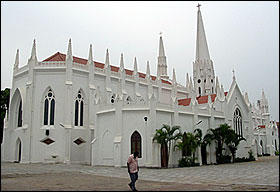 After
several days as an anti-tourist, sleeping till 11 and reading children’s
books of yore (E. Nesbit's "The Railway Children" though I
should be reading Sunil Khilnani's "The Idea of India") from the Madras
Club, I thought I ought to do a little sightseeing today so I paid a
visit to the Santhome Cathedral.
After
several days as an anti-tourist, sleeping till 11 and reading children’s
books of yore (E. Nesbit's "The Railway Children" though I
should be reading Sunil Khilnani's "The Idea of India") from the Madras
Club, I thought I ought to do a little sightseeing today so I paid a
visit to the Santhome Cathedral.
It was built in 1504 and claims that apart from St. Paul's in Rome, it is the only other Catholic Church to be built over the tomb of an Apostle. The Apostle in question, naturally, is St. Thomas, also known as Doubting Thomas. In the antechamber to the underground chapel that houses his tomb, there was a reproduction of that rather macabre Caravaggio painting showing St. Thomas fingering Christ's wound after the Resurrection, which I had seen many a time without knowing the story behind it.
There was also a little diorama of St. Thomas kneeling in a grave about to be speared. The Apostle was dressed in the manner the saints usually are, in a long robe, but his assassin, he of the spear, was dressed more native -- shirtless, with a short lungi. St. Thomas apparently came to the South in 52 A.D. and was killed 20 years later.
Sadly, being computer-less and usb-cordless I have no pictures at the moment. But I have great faith in the likelihood of Chennai’s having some cyber cafe where I can burn a photo CD and maybe even crop photos to a suitable size. We shall see about that anon.
Everyone in the church was super reverential -- kneeling before and kissing the portrait, the tomb and a relic containing a small piece of bone. Some temple-going habit were present there -- such as the removal of shoes – but the silence in the chapel and main church was very un-temple like.
The Christ on the main altar was quite different from the altars I've seen in other places, particularly in Latin American countries, where he tends to only wear a loincloth, be racked with pain and the torture is minutely depicted. Although he was still fair-skinned, and not Middle Eastern looking, he was fully clad in a long white robe and gazing forth from the altar in a meditative and composed manner. He was also hovering over a white lotus, with a peacock on either side. And a little in front of the statue were two flags, on the right side, the India one, and on the left side, a yellow and white one. I'll have to ask A. what that is. (the flag of the Vatican, it turns out)
Some people, in their reverence, in that not only had they touched and kissed the statues, they had also scribbled their names at the foot of the statue of St. Thomas.
A. has become a guide for me not just on how to get around but on all different aspects of Tamil culture, which she finds funny since she has lived all sorts of other places as well, and doesn't feel like any sort of expert at all. But I keep asking her things -- words, questions about people's last names and what geographic region they might be associated with -- because I feel very embarrassed about being perceived as a typical culturally chauvinistic North Indian who can't be bothered to learn anything about the South. In my case, my woeful ignorance extends to both North and South, but somehow I don't as much mind being perceived as a clueless foreign-returnee in Delhi.
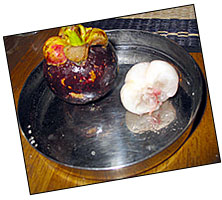 A.
and I keep marveling at the things the other does differently, even
down to small food habits. For instance she'll finish a meal with yogurt
and rice, and maybe pickle, but I must have yogurt with sugar. And a
bowl for everything. It was she who showed me the mangustan.
A.
and I keep marveling at the things the other does differently, even
down to small food habits. For instance she'll finish a meal with yogurt
and rice, and maybe pickle, but I must have yogurt with sugar. And a
bowl for everything. It was she who showed me the mangustan.
It's odd how every country has its North-South divide (and of course here there's East and West too, but I won't even try to get into that) and in most countries the South is perceived as more backward and less-developed. Why is that, I wonder?
In some countries, at the risk of offending, I would venture to say that's not always an entirely inaccurate perception. I'm thinking, for example, of how much more boorish Southern Italian men are to women, than their Northern counterparts. But in India, I think that the opposite is the case. Granted, this is on the basis of cursory visits (but also based on what friends in a better position than I am to know have said), but I have to say that I have been ogled much less and I have not seen any men peeing on the city streets yet. Surely that is evidence of an advanced form of civilization?
I was supposed to visit a typical Tamil Nadu temple in the afternoon -- the Kapaleeshwarar Temple, better known as the Mylapore temple -- which has architectural elements like gopurams, mandapams and a bathing tank. But I slept for three hours instead.
From what I wrote in my mosquito-infested journal Sunday, July 24:
Oops, I did it again!
I see the world "colonial" in a description of a place to stay and I totally fall for it. But I can't be the only one or people wouldn't be bandying it about so freely when they advertise things.
This
exact same thing happened to me in
The
next place I stayed in turned out to be a cell, just barely big enough
for a bed. And the window was cracked because they had just put in an
air conditioner since
And
finally, it was impossible to find the hostel in La Barra,
But all that is ancient history.
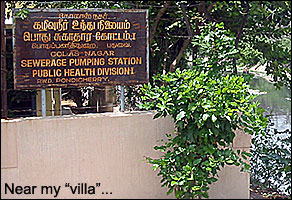 The
number one point, and really, the only point one need make against my
current abode in
The
number one point, and really, the only point one need make against my
current abode in
 Secondly,
the hotel is housed in a ramshackle old house, which is neither "Villa"
nor "Colonial" in my opinion.
Secondly,
the hotel is housed in a ramshackle old house, which is neither "Villa"
nor "Colonial" in my opinion.
Lastly, it is some ways out of town.
So as soon as I arrived this afternoon I went around looking for better accommodations, but they were all really expensive or full up.
 I
finally decided to bite the bullet and splurge on a guesthouse run by
a French lady on
I
finally decided to bite the bullet and splurge on a guesthouse run by
a French lady on
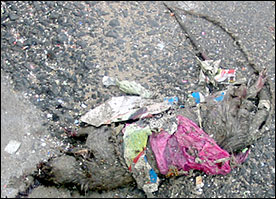 All
of this hassle made me take against
All
of this hassle made me take against
 I
think it felt particularly disappointing because I had really enjoyed
the bus ride over here. We went along something called the
I
think it felt particularly disappointing because I had really enjoyed
the bus ride over here. We went along something called the
So,
a fter tearing around madly, I returned all set to tell Villa Pondicherry
that I was checking out the next day. But after a cup of tea in the
living room and a chat with S., a former employee of the hotel who now
runs a restaurant in
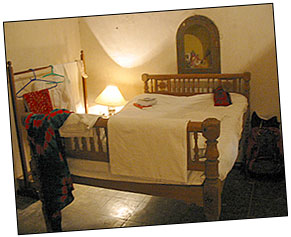
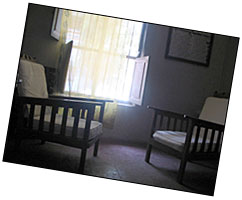 And
after all, my own room is quite nice and large (if somewhat full of
mosquitoes) and I even have a little sitting room, though no one to
sit with. And I could plan
my outings during the day so I wouldn't have to come back after dark,
or I could rent a bicycle so I could go to the center without relying
on autos. And the sewage pump is a good 50 feet away. And can I really
justify splurging so much a night on myself?
And
after all, my own room is quite nice and large (if somewhat full of
mosquitoes) and I even have a little sitting room, though no one to
sit with. And I could plan
my outings during the day so I wouldn't have to come back after dark,
or I could rent a bicycle so I could go to the center without relying
on autos. And the sewage pump is a good 50 feet away. And can I really
justify splurging so much a night on myself?
But
now I am dithering again and this is why. I was asking the pleasant
S. about going to Auroville (a sort of commune) when he offered to take
me there. I didn't really want to accept the offer, even though he seemed
very nice and decent, because it is my experience in
So
I suggested we go Tuesday, because earlier I thought he had mentioned
that he was returning to
Later, when I had retired to my room, there came a furtive knocking at the door. Shades of Ranikhet!
And lo and behold, it was S., requesting that if the hotel owner should ask about my plans for the next few days, I should NOT mention that S. was taking me to Auroville. Wasn't that a very odd request?
S.'s
explanation for the request was that if the owner knew he was taking
girls on trips he would feel very uncomfortable. Which explanation made
me feel even more uncomfortable than I was already feeling.
And later, quite cross, for why must I be involved in the hotel's internal
politics?
In
fact, I am sure this has all ensued because when S. asked me what I
had been doing at a local cafe that he saw me at earlier, I answered
truthfully, "Drinking beer." He looked very astonished at
this reply, so perhaps this was not the correct answerto such a query.
I
must remember to put the ring my sister gave me back on my left ring
finger.
But
now what to do? I hate to be paranoid and think the worst of people,
but surely the conversation was strange? So perhaps the best way to
extricate myself from this field trip without causing offense is by
moving to one of the other guesthouses. Except, now that I think about
it, the cheaper guesthouse is run by three single men, one of whom,
a Nepali, said he loves people from Delhi. But no Nepali person I met
yet has ever confessed to liking Indians, and certainly not ones from
I thought
I
think
If
only N.P. were here, then we could be having a jolly time together without
any of these worries. Als sometimes it's hard to stay cheery and see
the positive or amusing side of things, including awkward situations, all
by yourself.
Well. Tomorrow I will either get married or rent a bicycle.
Monday,
Today I rented a bicycle. It costs only Rs. 30 a day, but after biking 6 kilometres to a rather sad beach and back my nerves are shot to pieces! But at least I have got my exercise for the day.
 It really requires nerves of steel to drive on roads here, and some ladies have such nerves, for I have seen many of them clad in saris with jasmine in their hair zipping around on bicycles and mopeds. In fact I got into quite a traffic jam when I was passing the government women’s college at closing time.
It really requires nerves of steel to drive on roads here, and some ladies have such nerves, for I have seen many of them clad in saris with jasmine in their hair zipping around on bicycles and mopeds. In fact I got into quite a traffic jam when I was passing the government women’s college at closing time.
The worst are the buses since they overtake all the time and so at any given moment there is a bus barreling at top speed towards you. And all the auto rickshaws have squeaky horns that sound like squawking chickens or mooing cows and they creep up behind you and then suddenly honk very loudly. So that is all quite trying.
I just thought I would do a little tour of the town but I found myself going in the direction of something called “Auro beach” and just kept going. Later I realized that I was on the road that had dampened my spirits when approaching
It was quite easy to find the beach – I just followed the foreigners on mopeds, which they all seem to rent.
As usual, I am the only nonwhite person staying in the hotel (this was generally the case in
And
all the white people are French! The two girls staying opposite me are
Very French and not very nice, which made me glad that I stole a bit
of their toilet paper since I forgot to buy any myself. But I paid for
it later when I decided to take the wad of paper I had swiped, instead
of my newly bought roll into the bathroom, just to make my own roll
last as long as possible. It was so hot in the bathroom that I had to
wipe my forehead several times with it and then it wasn't much good
for anything else.
This
morning, at breakfast, one of them made (one thing I will say for the
French, they have a word for everything) a little moue face, wrinkling
up her nose, when she saw coconut chutney on the table. She doesn't
like it. In fact, none of the French people were eating Indian food,
even though I realized it was an option after I saw the hotel owner
eating some lovely idlis and chutney. One of the French guys, even though
he had been here a while, didn't even know what it was. That made me
kind of cross. It seems like such an enclave form of traveling. I mean,
I know
It's
so funny how conflicted one feels about these things. It's sort of like
how you can freely say all sorts of mean things about your own relatives,
but you'll be furious if any one else does.
Speaking of relatives, this morning the hotel owner spent a lot of time shouting at his staff. One left yesterday and he had a new lot today, who were not up to snuff. After returning to the breakfast table, the owner confided some of his managerial woes to me as follows:
"I mean, you tell somebody one time, two times, but three times he is still doing the same things, it's like man, what is wrong with you? New York, Paris, you don't have these problems, but India it is very difficult. I was out of station all day, seven people are there, but they did not think about today's breakfast. And when I saw the fellow pouring hot water into the old coffee to make today's coffee, man, I lost it. These things you don't have them in Delhi, etc. etc."
I had a strange feeling of deja vu listening to all this, and I realized that I was reminded of siting with my mother at breakfast, which was strangely comforting.
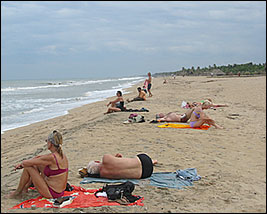 Anyway, after lolling about with the French on the beach for a short while, I have returned from my bicycle ride, with the help of many prayers and incantations, and by biking very, very slowly.
Anyway, after lolling about with the French on the beach for a short while, I have returned from my bicycle ride, with the help of many prayers and incantations, and by biking very, very slowly.
I
had to spend loads of money today to leaven the stressfulness of my
bicycle ride. So I have to completely disagree with what the Wickham
character said in "Bride and Prejudice," which A. and I got
many laughs out of in
"You
don't need any money to enjoy
Well,
maybe it's true as long as the little you do have is in dollars or euros.
Now
I think I'm going to take a guided tour to Auroville.
 One
thing that surprised me about
One
thing that surprised me about
Tuesday, July 26
 For a town with a Catholic history, Pondicherry certainly has a lot of temples and mosques, and I keep falling all over them. Today, while looking for the Botanical Gardens, I biked past the Pondicherry waqf (a part of Islamic law to do with charitable property holding) and haj central office, which was aptly located near Mulla Street.
For a town with a Catholic history, Pondicherry certainly has a lot of temples and mosques, and I keep falling all over them. Today, while looking for the Botanical Gardens, I biked past the Pondicherry waqf (a part of Islamic law to do with charitable property holding) and haj central office, which was aptly located near Mulla Street.
Today was a very quiet day, devoted to eating new food items and washing clothes, both of which have put me in a more amiable frame of mind towards Pondicherry.
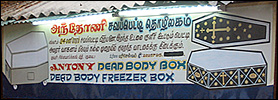 It
turns out that Villa Pondicherry is located not only next to a sewage
station but also near several cemeteries and coffin shops (which advertise
their wares in rather a descriptive fashion). I visited one graveyard
this afternoon and it was the most peaceful (I suppose it's not surprising)
place I had been to here, especially once I was realized that the caretaker's
son spoke English and I explained that I did not at all mind walking
around by myself.
It
turns out that Villa Pondicherry is located not only next to a sewage
station but also near several cemeteries and coffin shops (which advertise
their wares in rather a descriptive fashion). I visited one graveyard
this afternoon and it was the most peaceful (I suppose it's not surprising)
place I had been to here, especially once I was realized that the caretaker's
son spoke English and I explained that I did not at all mind walking
around by myself.
 It
was very falling down and neglected, but somehow in this circumstance,
it wasn't quite so upsetting. It seemed fitting that the tombs,
like their denizens, were crumbling to dust.
It
was very falling down and neglected, but somehow in this circumstance,
it wasn't quite so upsetting. It seemed fitting that the tombs,
like their denizens, were crumbling to dust.
 It
was interesting to see all the French names, and how over time they
merge into Tamil names, as well as mention of other former French
colonies. One couple buried there had been born in Phom Penh, and the
husband had served as police chief there.
It
was interesting to see all the French names, and how over time they
merge into Tamil names, as well as mention of other former French
colonies. One couple buried there had been born in Phom Penh, and the
husband had served as police chief there.
I didn't get out till quite late today because I spent three hours reading "The Hindu," whence I gained some interesting information, but also many things to be worried about. Italics are mine.
Item no. 1: Sanitary park opens
The Tiruvannamalai park aimes to "create awareness against open defecation ... on display [were] various toilet models like bathroom-attached toilet, anganwadi toilet, western toilet, low cost asbestos-roofed toilet, bamboo reaper toilet, polythene sac toilet and leech pit-linked toilets."
Item no. 2: Man sets family on fire
"A 50-year-old man alleged killed his three children and ... set his wife ablaze. The incident ... came as a rude shock to the local residents."
Item no. 3: Pondicherry weather report
"Today: A hot & uncomfortable day. Tomorrow: The day continues to be hot & uncomfortable."
Wednesday, July 27
I finally got to Auroville, the kibbutz or commune-like settlement near Pondicherry that was started in 1968 by "The Mother," and is also inspired by Sri Aurobindo's teachings.
Their creed is:
"Auroville wants to be a universal town where men and women of all countries are able to live in peace and progressive harmony above all creeds, all politics and all nationalities. The purpose of Auroville is to realise human unity."
Also, in a video I saw at the visitor's center, they said that Aurovillians renounce all religions "ancient and modern, new and future."
There are about 3,000 people living there, the majority from India, France and Germany, and then a smattering from other places.
The center of the settlement is something called the Matrimandir (Mother Temple) which is a gigantic round ball covered in gold (colored) discs, which are solar panels. We couldn't go inside because they were renovating the place -- work on the ball has been going on since 1971 -- but apparently there is a giant crystal there that electronically reflects a single ray of sunlight and illuminates the globe. It's a little sci-fi.
Someone at Villa Pondicherry made a joke that one day the crystal would shatter and people would start rubbing their eyes and saying wonderingly, "I used to live in a small town in Italy and now I am here..."
It covers a large area and it's very green and shady and well-laid out and reminded me very much of another super-planned place I saw recently where right-of-entry is similarly restricted: The New Delhi IIT (Indian Institute of Technology). The campus is very orderly and almost traffic-free -- not all vehicles can enter and there are special auto-rickshaws that only drive around the college campuse. Both are versions of gated communities, though their inhabitants are brought together by ostensibly higher-minded interests -- love of science, interest in world peace – than one usually associates with residents of gated neighborhoods.
This is the cellphone billboard I had mentioned earlier. I wonder if it will make sense to anyone who hasn't lived in India or perhaps South/Southeast Asia:
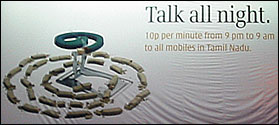
On Thursday I return to Chennai and then head to Kochi (12-hour train!). I must just recognize my disposition and understand that I will hate it for the first 24 hours. So I should only start thinking about what I think of the place after that.
Of Class, Caste and Cutlery (Written on the train on Thursday, July 28)
Is there any word in English that means quite the same thing that "jhutha" does? The closest I can think of is "tainted."
On my last night at Villa Pondicherry, I attended a little farewell gathering for a Danish couple the guesthouse owner had become fond of. Over drinks, one of the French guests insisted that A., another one of the guesthouse's former employees, first drink from his mug of beer, then eat some pasta off his fork.
Now, in my understanding of Indian social graces, that's just "not done." Once you've touched your lips to a glass, bottle, fork or spoon, it's "jhutha," and no one else will want to use it. This is a very basic understanding of the concept. It's very complex and comes into play in India in millions of ways, such as who has the right to well water and in what order and people are murdered over it.
I don't consider myself someone who is very aware of caste hierarchies -- and certainly I don't believe they should be a basis for discrimination. Yet I found myself feeling very uncomfortable over this interchange, both on A.'s behalf, but also because I realized that it would be difficult for me to offer my fork so nonchalantly to someone so clearly from a different class than me, at least in India. I know logically I shouldn't feel that way, and it's shaming, but I do. I don't know where it comes from, since I've had what most would call a progressive upbringing, but it's true that as long as I can remember, most Indian families I know, even in cities, have one set of glasses and dishes for family and friends, and another for other people, i.e. servants and so on.
And I think lots of Indians of my generation, myself included, have unwittingly adapted religious notions of ritual pollution and purity and created our own, perhaps more easily rationalized, set of discriminations. Looking at my own biases, I know that I don't like to share dishes with people I don't know very well (which seems fair enough, right?), people I don't like and people with bad breath, even if I both know and like them.
The obsession with taintedness come out in other ways too. My sister and I realized that we both have an abhorrence of kitchen sponges traveling to the bathrooom and vice versa. And of course, within the bathroom, spnges for the toilet, bathtub and sink should not consort with one another. Another friend of mine, also from South Asia, said she had the same system, so I put this down to a general human habit. But J., my brother-in-law, who is from South Dakota, said that this was an Indian thing, another manifestation of our national pathology.
K., an Indian friend, said that he knows someone who, in a curious marriage of biological and religious concepts, wrings his hands and says, "The molecules! The molecules!" when thinking of things that shouldn't be touching touching.
Which is what K. said when I had the brilliant idea of using an old muslin slip (worn once, over five years previously) as a cheese cloth to make paneer. Anyone else repulsed? True Hindus, you.